|
Have you heard of the land of Equestria, where earth ponies, pegasi, and unicorns live in harmony (and maybe sometimes discord 😉)? If not, you are missing out on some AWESOME, as Rainbow Dash would say, career development lessons. Yes, I am talking about the animated series, My Little Pony, Friendship is Magic. As a parent, I have watched my fair share of animated shows. I can say without a doubt, I have never seen one that packs more career wisdom. So if you don’t have time to binge-watch over 200 episodes, here are the top three lessons on career exploration.
Lesson 1: Everyone has unique skills. The series highlights the lives and friendships of 6 ponies, called The Mane Six. Each of these ponies is very different, with unique interests, personalities, and skills. These differences are celebrated, and in fact, it is these differences that create a new kind of magic when used together. This principle theme of the series is a reminder that we must honor ourselves when choosing a career, and not the expectations set for us. Lesson 2: It’s not always easy to find your passion. The stars, rainbows, and hearts that adorn the flanks of these cartoon ponies aren’t just for decoration. In fact, they serve a purpose… a career exploration purpose. They are a representation of that pony’s special skills. And these “cutie marks” as they are called, are not always easy to get. One ongoing storyline follows three young fillies as they try to find their passion and earn their cuties marks, thus reminding us all that career exploration is a sometimes long and difficult process. Lesson 3: A job is what you do, not who you are. As we follow the lives of the residents of Ponyville, we see their jobs are a fulfilling part of their lives, but that they also have time for other things like defending against evil villains and solving friendship problems. My Little Ponies have excellent work life balance. A lesson we could all benefit from! My Little Pony is a wonderful series that shows us that career development is magic! What is career development?
Career development is a life-long process of learning about yourself and what you like while exploring the world of work and seeing where these two things overlap. Why do kids need to know about career development? During my 8+ years as a career counselor I worked with hundreds of college students struggling to choose majors and/or careers. Many of these young adults were experiencing significant distress over their decision. If only they were introduced to the career development process earlier, they would have the tools to navigate this journey. Once I had my own children, I realized how advantageous it is for kids to be aware of the career development process much younger. Don't most schools teach students about career development? The reality is most elementary and highs schools don't teach career development. And schools that do, often focus these programs on college preparedness. That's why it is so important for parents to begin these conversations. And talk to their children about this important part of their child's development early and often. How do I talk about careers with my kids? Here are three great resources to help you talk to your kids about career development. 1. My book, The Career Explorer, is a great introduction to the process through an entertaining story. 2. My career course for parents/educators of preschool through elementary-aged children. Through a series of 7 short lessons, parent and educators will learn the information they need to begin discussing career development with their children. Simple, age-appropriate activities and discussion questions will give you the confidence to incorporate each lesson into interactions with your kids at home. 3. My career development course for kids is an introduction to the career development process for 6-11 year olds. This engaging, expertly designed course, introduces the career development process so children can begin to understand how to choose a career that they will enjoy. Through a series of 8 short, recorded lessons, children (ages 6-11) will learn how to begin exploring the world of work and learning more about themselves! The big corner office, a lucrative career that allows for lavish vacations and luxury cars, power and prestige...how do you define success? As a career counselor helping college students identify a career path, I would often ask this very question. Each student would answer a little differently based on their personal values. Many of them would be influenced by the more is better, money equals success myth. And I suppose I believed this as well, at one point. But then I pursued a career in higher education and realized that something other than money would have to define my successes. Because unfortunately my field was not one known for high salaries and extravagant perks. This coupled with the work that I do now with helping parents become more competent and knowledgeable in career development has led me to ask myself this very question again. How do I define success? And what do I want my children to consider? Part of becoming more competent and knowledgeable in career development to better serve your children, is unpacking the preconceived notions that we all hold. If your goal is to be an unbiased guide for your children through the career exploration process, then you have to address your own beliefs. And in the last few years I have spent time wrestling with these exact constructs. Be my own definition, I am unsuccessful. I don’t work in an office, I work out of my home. I don’t have unlimited disposable income. If I need a new car, or want to take a vacation, I must save for it (sometimes for years). Do I feel unaccomplished? Not at all! In fact, I feel like I am truly using all my strengths. Because I am my own boss, I have tremendous work life balance. My days are spent engaged in the very meaningful and very real work of parenting and raising children. And that allows me to also have time to write, illustrate, and create content that is important to me. I also am able to feel challenged and to implement new ideas without seeking permission. I never thought I would enjoy the entrepreneurial life due to the risk, but I have found that this freedom is very appealing.
So here are three lessons a career counselor learned when she sat down and addressed her own definition of success. Perhaps it can encourage you to redefine your view of career success as well. Celebrate what is important to you In my current role, I have to look for opportunities to be successful. I work from home, in a one person organization. If I don’t celebrate my success, no one will. I don’t have a supervisor touting my achievements, or co-workers giving me kudos on a job well done. I have to be intrinsically motivated to continue to do the work, even though it sometimes seems like no one even notices what I am doing. You define success I have to be willing to re- evaluate and change my definition of success frequently as my life stage changes. Right now, time freedom and work life balance is much more valuable to me as a parent to small children than money or prestige. Success is doing something you love The core of your work should be something that you are passionate about. It shouldn’t be a luxury to have a career that you enjoy. And if something isn’t working for you, you can change your mind and your circumstances. This is what I want to impart to my children. A successful career is doing something that they enjoy, no matter how much work it takes to get there. When you think about a successful career what comes to mind? What do you want to teach your child about career success? Career development is the life-long process of learning about yourself and the world of work to help manage your career goals. As parents, we are our children’s first teachers. Many essential life skills are learned through modeling, observing, and in some cases, direct instruction. Long before a child enters any kind of formal educational setting, parents are teaching children the fundamentals of being a human, like how to walk, talk, and of course use the potty (very important indeed!). But one area that is virtually ignored is career development. We live in a society obsessed with careers. As children, we are asked what we want to be when we grow up. As adolescents, we are shuttled to lessons and activities that are supposed to make us academically well-rounded and desirable. As young adults, we are quizzed about our future career goals. But what is often lacking, is informed discussion and guidance about career exploration. Many students are not familiar with even the basic steps of career development until high school or college. And while this may seem like an optimal time, as students are faced with furthering their education, selecting majors, and choosing careers, it is often a time of high stress and anxiety. However, if the career development process is introduced well before a career decision needs to be made, and discussed often in an age-appropriate way, stress and unrealistic expectations can be reduced.
Obviously, career development is important, and most parents would agree that they want their children to grow up and find a career that they enjoy. So why aren’t we spending time teaching children how to properly navigate this path? My answer...parent’s feel unable to teach this topic, because they feel that they haven’t mastered it themselves. But mastery is not part of your role in a child’s career development process. Instead, focus on:
Do you want to become a career competent parent? Need some help to get started? I have several resources to help. *My eCourse walks you through the steps of the Career Development Process and provides you with activities and discussion questions. *My book The Career Explorer introduces children to the basic principles of the career development process. If you want to explore even more, download the curriculum that complements the book. * This blog post provides more tips and hints as well. But as an introvert myself, I must admit, that having twins suits my personality type just right! I’m naturally introverted. This does not mean that I am shy or that I don’t like people, as is often assumed. It simply means that I need time alone to recharge. As a career counselor who is certified in the MBTI personality inventory, I have helped hundreds of people discover and understand their personality types. But it wasn’t until I had twins that I started to think about how your personality can impact parenting. Certainly, no one personality type is perfect for parenting multiples, but here are 3 times when having twins is an introvert’s dream.
When you don’t want to go somewhere Every introvert knows the drill. You are invited to a party, or a playdate, or a work event. And you have to come up with an excuse, as to why you can’t go. But guess what... once you have twins, you don’t have to come up with an excuse. Now you have a reason. Taking your two babies out of your house during that first year is so much work that everyone will give you a pass. When you don’t want to make small talk Chit-chat is often disliked by introverts, who prefer more meaningful conversation. When you are out with twins, you don’t have time to talk to anyone. Someone always needs your attention. You may start many conversations, but will inevitability be pulled away by a toddler needing a drink, or help finding their toy. This phenomenon hits epic proportions at the park when upon exiting the confines of their car seats, your multiples will scatter in different directions leading you to spend all of your time scanning the corners of the playground to ensure everyone’s safety. When you just need to be alone for a few minutes In most cases, more children mean less alone time for their parents. Unless you are talking about twins. One of the many cool things about parenting twins is their ability to entertain each other. Twins are often satisfied playing with each other, which can give you a pass every once in a while when you just need a moment alone to decompress. Personality theory says that no one personality type is better than any other. And I whole-heartedly agree. But as an introvert myself, I must admit, that having twins suits my personality type just right! It's that time of year again... time for buying and receiving of all the things. Do you have a child who loves to dream about their future? If so, then I have a great gift guide for you. I have hand picked 5 items that are perfect for open-ended career-related play. Pretend Play Clothes- Pretend play is a hallmarks of career exploration. Let your child try out a potential career with some dress-up clothes.
Game of Life Junior- This is a junior version of the classic game for younger kids. A fun way for the whole family to discuss career development. Magnet Dress Up Play Set- This magnetic play set features endless combinations of career-related clothes to mix and match. It also comes with a carrying case. Gifts of Experience- Giving a child the gift of an experience is always a good idea. Passes to a museum, tickets to a show, or classes/lessons are an excellent way to support a child's budding interests. The Career Explorer- Of course, I have to include a book! I think books are the perfect gift and this one explains the career development process in an age-appropriate and engaging way. You can see my Toddler Twin Gift Guide here.
Books are a wonderful way to introduce a variety of career options to young kids. Here's a collection of my favorites.
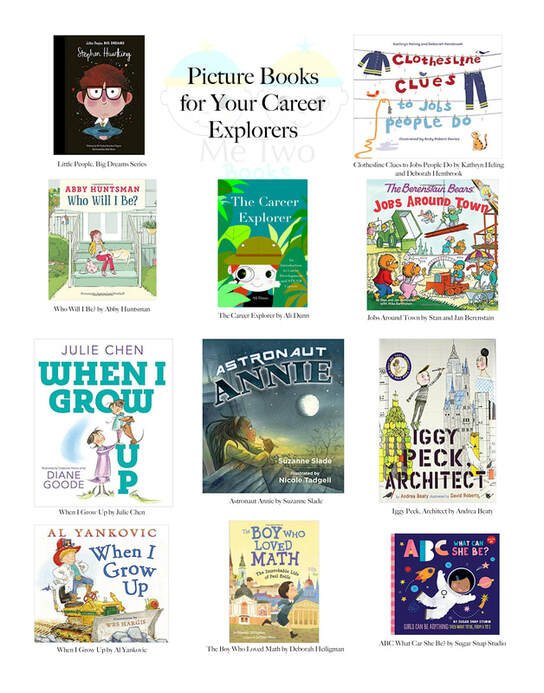
Little People, Big Dreams Series Little People, BIG DREAMS is a best-selling series of books and educational games that explore the lives of outstanding people, from designers and artists to scientists and activists. All of them achieved incredible things, yet each began life as a child with a dream. Clothesline Clues to the Jobs People Due Who wears what to work? The clues in each lively verse can be spotted hanging from the clotheslines. A mail carrier’s uniform, the artist’s brushes, and the chef’s apron all hang from the clothesline. Then turn the page to learn which professionals wear and use the special gear in the jobs they do. Clever illustrations show the workers helping one another, and in the end, everyone joins together for a celebration that is out of this world. A perfect choice for reading aloud and encouraging kids to join in the guessing and reveal. Who Will I Be? When Isabel’s teacher asks her students who they want to be when they grow up, Isabel doesn’t have an answer. Isabel knows it makes her happy to help her friends, neighbors, and family—but can a person really grow up to be a helper? It’s time for Isabel to open her eyes and her heart and see all the different jobs people do: the police officers, firefighters, soldiers, teachers, doctors, and clergy who dedicate their lives to helping people every day. The Career Explorer "What do you want to be when you grow up?" This is a common and favorite topic of discussion for kids. It's never to early to start talking about how and why people do the work they do. The Career Explorer is a book that introduces children to the basic principles of the career development process. With the help of Mae Morer, the career explorer, children learn that choosing a career is a life-long process that starts with looking inside themselves at their values, interests, personality, and skills. Colorful geometric illustrations and rhyming text highlight a selection of possible careers in STEAM fields (science, technology, engineering, art, and math). Jobs Around Town Searching for the perfect job, the Bear siblings learn to celebrate the many talents of others and begin to imagine where their own gifts will take them as they grow. When I Grow Up One night while getting ready for bed a little boy starts to wonder what will life be like when he grows up. He could be a painter, a musician, a mountain climber, a mayor. He tells his mother all about his big ideas…and all of the other things he wants to do. But when will he grow up? And why does it take so long? Astronaut Annie Annie's joyful exuberance and her family's whole-hearted support leave no doubt that her dream is within her grasp. This delightful story―with backmatter about women astronauts―encourages young readers to pursue their dreams and reach for the stars. Iggy Peck, Architect Some kids sculpt sand castles. Some make mud pies. Some construct great block towers. But none are better at building than Iggy Peck, who once erected a life-size replica of the Great Sphinx on his front lawn! It’s too bad that few people appreciate Iggy’s talent—certainly not his second-grade teacher, Miss Lila Greer. It looks as if Iggy will have to trade in his T square for a box of crayons . . . until a fateful field trip proves just how useful a mast builder can be. When I Grow Up It’s Show-and-Tell time in Mrs. Krupp’s class, and Billy just can’t wait for his turn! Today the class is discussing what they want to be when they grow up, and our exuberant eight-year-old hero is bursting to tell everyone about his future career plans. The Boy Who Loved Math Most people think of mathematicians as solitary, working away in isolation. And, it's true, many of them do. But Paul Erdos never followed the usual path. At the age of four, he could ask you when you were born and then calculate the number of seconds you had been alive in his head. But he didn't learn to butter his own bread until he turned twenty. Instead, he traveled around the world, from one mathematician to the next, collaborating on an astonishing number of publications. With a simple, lyrical text and richly layered illustrations, this is a beautiful introduction to the world of math and a fascinating look at the unique character traits that made "Uncle Paul" a great man. ABC What Can She Be Each page introduces a letter of the alphabet and highlights a career that is fun, challenging, and makes a big impact in its own way. A boldly illustrated, fun family read, ABC What Can She Be? is a great way for parents to introduce their small children to the bright futures before them. Some of the links below are affiliate links. At no additional cost to you, I may earn a small commission if you use the link to purchase the item. Before I was a mother to preemie twins, and a children’s book author, I was a career counselor. During my 8+ years in the profession, I worked with hundreds of young adults struggling to select majors, choose careers, and plan their futures. Many of these students were experiencing significant distress over these decisions. Of course, this was understandable, because there is a perception that you must choose the perfect career. But career research tells us that this perception is false, and most people have several completely different careers throughout their professional life. One thing that always struck me was that after a few meetings, students began to relax. Once they were introduced to the career development process, the stress decreased and they were able to create a plan to find a career that was a good fit for them at this point in their life. If only they had been introduced to the career development process earlier. Perhaps they could have avoided a great deal of stress and unrealistic expectations.
The career development process is the same whether you are 5 or 50 years old. And it is never too early to discuss with children why and how people do the work that they do. In fact, around 3-4 years of age, is the ideal time to introduce the basic tenets of career exploration. This is the age where pretend play is developing, and many parents begin to notice an interest in careers and the future. Here are a few things that parents can do to foster a healthy sense of career development in young children. Learn About the Career Development Process The career development process begins with self-awareness. One must know their own values, interests, personality, and skills. Without this information, a career decision is incomplete. Often times people are making career decisions based on one or two of these factors (typically interests and skills). Parents can assist their children by helping them build self-awareness in all 4 areas. Encourage Exploration When children are young, exploration is key. Career decision is many years away, so the focus at this age is exposure to as much as possible. One simple way to do this, is by reading books about different careers. Encourage children to explore what they like, what they are good at, and even what they aren’t so good at. Interest and skills can take years to develop, so why not start now. Early exploration builds skills, career awareness, and a variety of interests. All of which will be beneficial down the road. Share Your Own Career Experiences A very easy way parents can help their children in the career development process is to share their own experiences. Make sure you are sharing what your work day was like, and what you enjoy about your job. Stay Positive Children go through many phases before a career idea ultimately sticks. Regardless of what your child is currently “in” to, it’s best to always talk about it in a positive way. I can’t tell you the number of college students that I have counseled that have found their passion, but it’s not accepted by their families. I advise parents to always come from a place of support. There are plenty of people and factors that will tell your child that they can’t do something. What they need from you is unconditional support. Career development is a life-long process. Its never too early to start helping young children understand the steps. If you want more information, I have many more resources to assist parents, including an Introduction to Career Development eCourse. Check out www.metwobooks.com for more. |
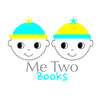
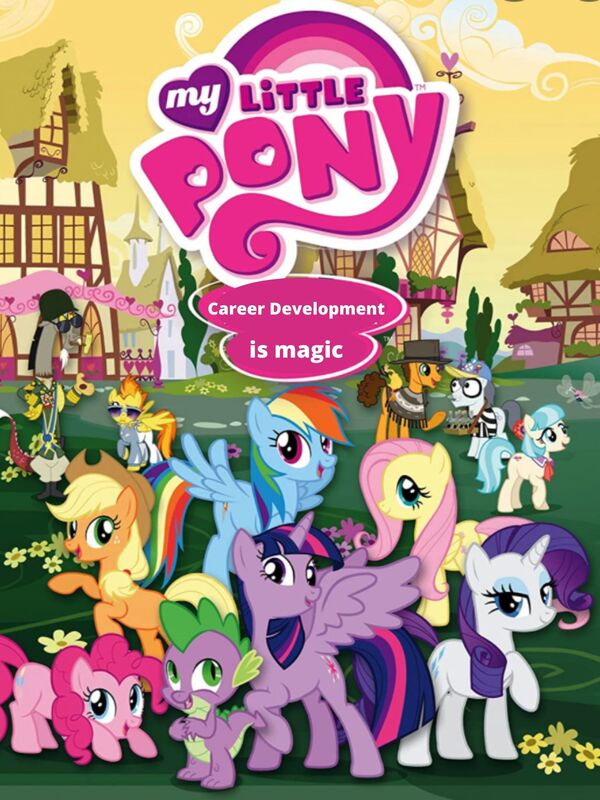


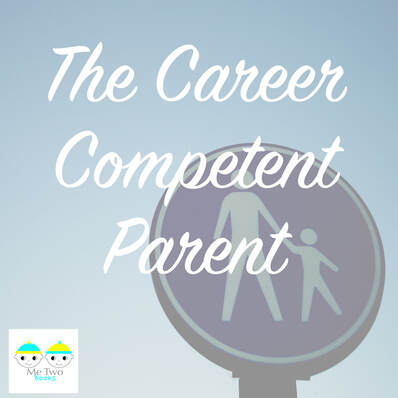

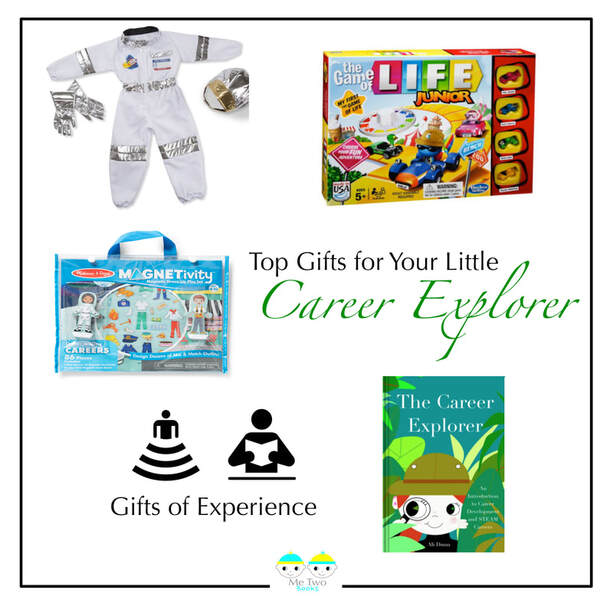
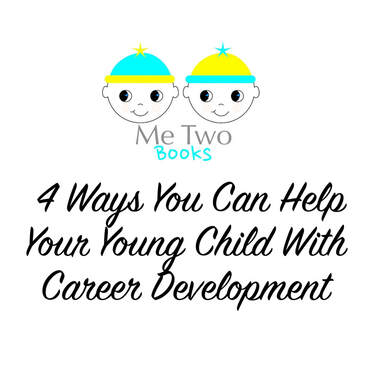
 RSS Feed
RSS Feed